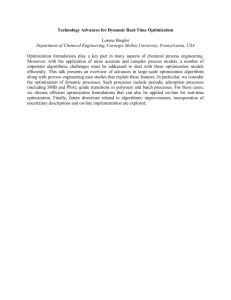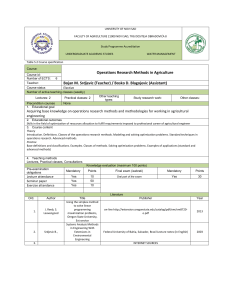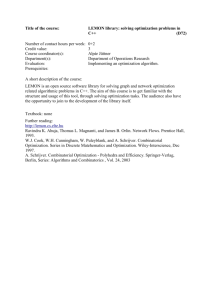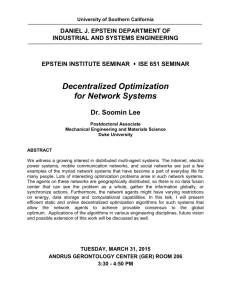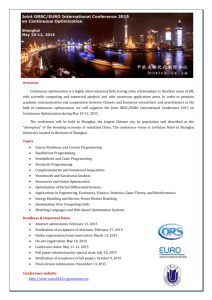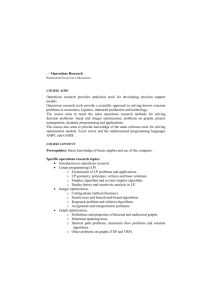Efficient Computational Strategies for Reliability
advertisement
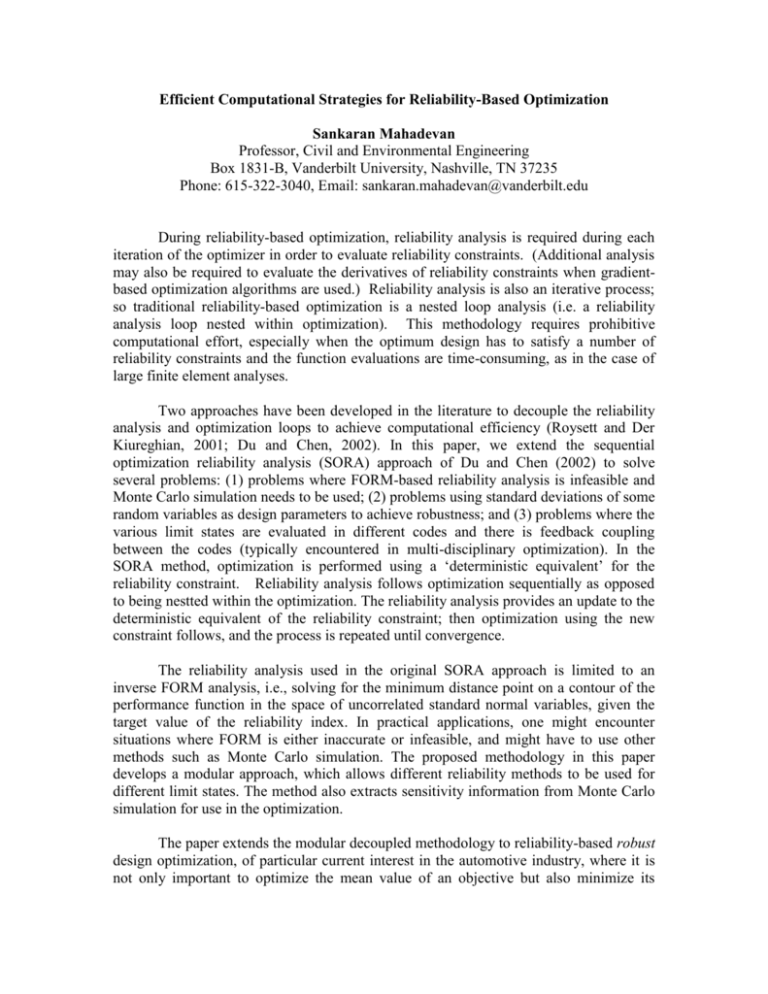
Efficient Computational Strategies for Reliability-Based Optimization Sankaran Mahadevan Professor, Civil and Environmental Engineering Box 1831-B, Vanderbilt University, Nashville, TN 37235 Phone: 615-322-3040, Email: sankaran.mahadevan@vanderbilt.edu During reliability-based optimization, reliability analysis is required during each iteration of the optimizer in order to evaluate reliability constraints. (Additional analysis may also be required to evaluate the derivatives of reliability constraints when gradientbased optimization algorithms are used.) Reliability analysis is also an iterative process; so traditional reliability-based optimization is a nested loop analysis (i.e. a reliability analysis loop nested within optimization). This methodology requires prohibitive computational effort, especially when the optimum design has to satisfy a number of reliability constraints and the function evaluations are time-consuming, as in the case of large finite element analyses. Two approaches have been developed in the literature to decouple the reliability analysis and optimization loops to achieve computational efficiency (Roysett and Der Kiureghian, 2001; Du and Chen, 2002). In this paper, we extend the sequential optimization reliability analysis (SORA) approach of Du and Chen (2002) to solve several problems: (1) problems where FORM-based reliability analysis is infeasible and Monte Carlo simulation needs to be used; (2) problems using standard deviations of some random variables as design parameters to achieve robustness; and (3) problems where the various limit states are evaluated in different codes and there is feedback coupling between the codes (typically encountered in multi-disciplinary optimization). In the SORA method, optimization is performed using a ‘deterministic equivalent’ for the reliability constraint. Reliability analysis follows optimization sequentially as opposed to being nestted within the optimization. The reliability analysis provides an update to the deterministic equivalent of the reliability constraint; then optimization using the new constraint follows, and the process is repeated until convergence. The reliability analysis used in the original SORA approach is limited to an inverse FORM analysis, i.e., solving for the minimum distance point on a contour of the performance function in the space of uncorrelated standard normal variables, given the target value of the reliability index. In practical applications, one might encounter situations where FORM is either inaccurate or infeasible, and might have to use other methods such as Monte Carlo simulation. The proposed methodology in this paper develops a modular approach, which allows different reliability methods to be used for different limit states. The method also extracts sensitivity information from Monte Carlo simulation for use in the optimization. The paper extends the modular decoupled methodology to reliability-based robust design optimization, of particular current interest in the automotive industry, where it is not only important to optimize the mean value of an objective but also minimize its variance. In this context, standard deviations of some variables are used as design parameters (referred to as tolerance design). The twin objectives of reliability and robustness lead to a multi-objective optimization problem. Several methods available for such optimization are combined with the decoupled methodology for computational efficiency. In multidisciplinary systems, the evaluation of different limit states may require different individual disciplinary analyses. For example, an aerospace system may have limit states related to aerodynamics, structural and thermal disciplines, and each disciplinary analysis is done separately. However, each analysis depends on the output of other disciplinary analyses. Several deterministic optimization approaches have been developed for such coupled systems. This paper develops a methodology for extending the decoupled approach to the reliability-based optimization of coupled multidisciplinary systems. The proposed methodology is illustrated with several example applications to structural, automotive and aerospace systems. References 1. Royset, J.O., A. Der Kiureghian, and E. Polak, "Reliability-Based Structural Design by the Decoupled Approach," Reliability Engineering and Structural Safety, Vol. 73, pp. 213-221, 2001. 2. Du, X., and W. Chen, "Sequential Optimization and Reliability Assessment Method for Efficient Probabilistic Design," Proceedings of the ASME Design Engineering Technical Conferences, Montreal, Canada, Paper number DETC 2002/DAC-34127, 2002. Acknowledgement The study reported in this paper is being supported by funding from two sources, NASA Langley Research Center and General Motors. The support is gratefully acknowledged.
